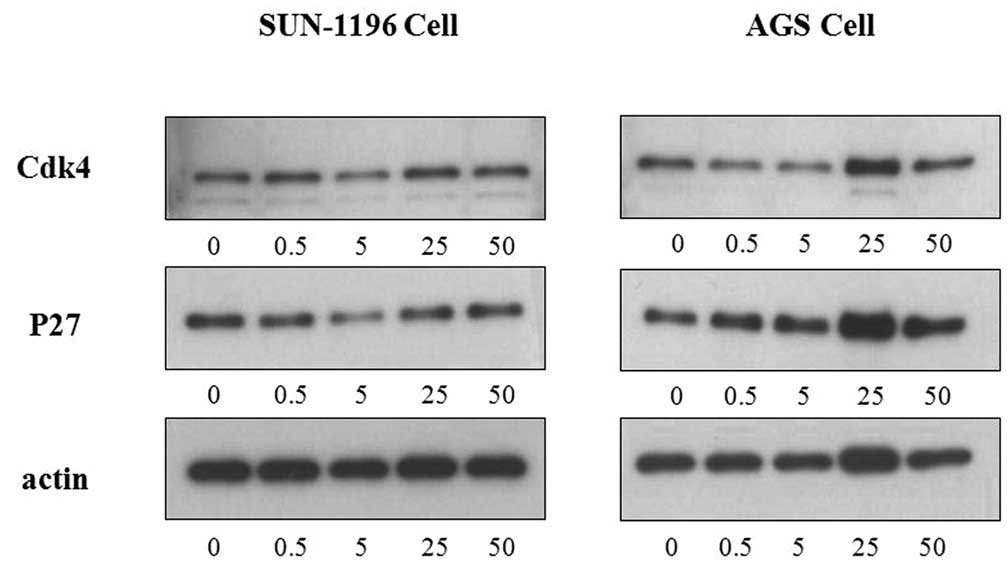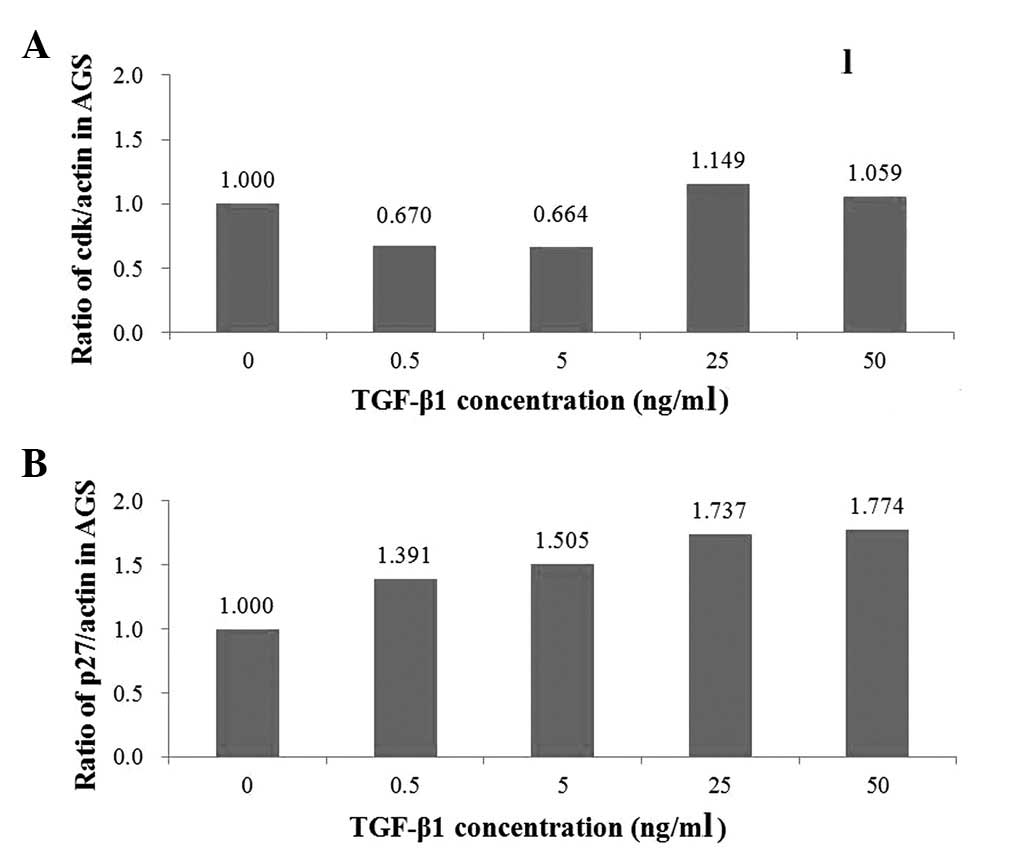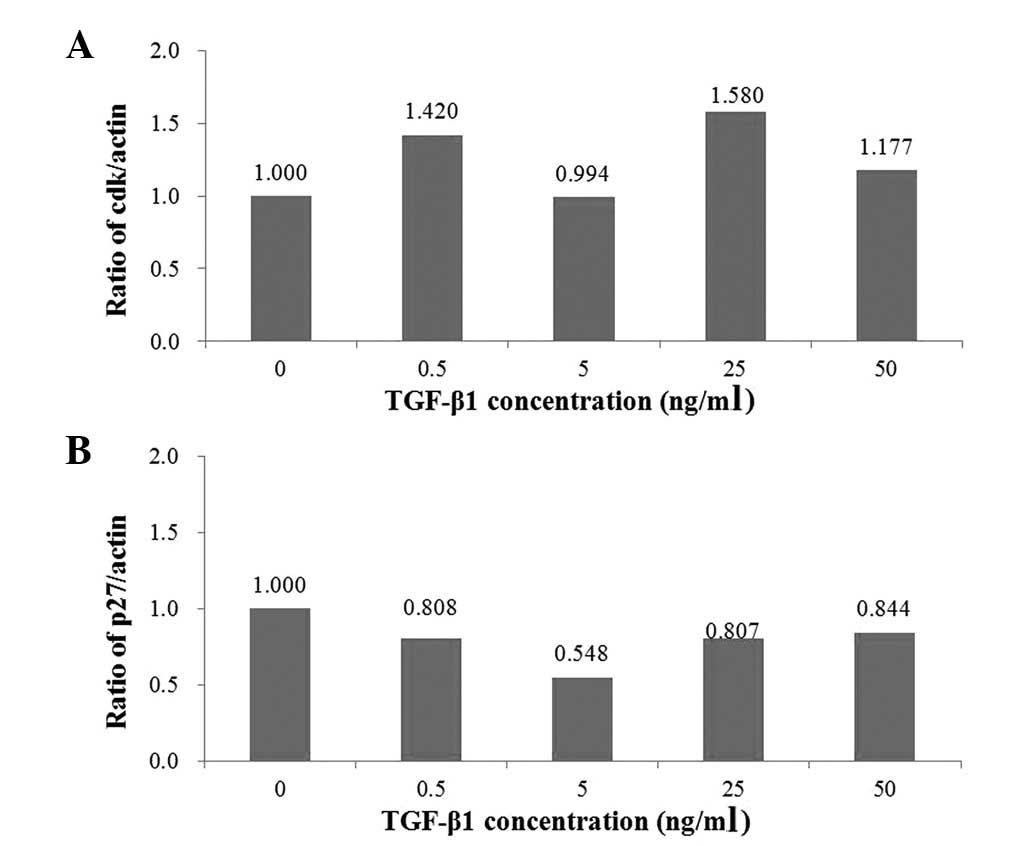|
1.
|
World Health Organization: Cancer: Fact
sheet N297, February 2009. http://www.who.int/mediacentre/factsheets/fs297/en/.
Accessed March 24, 2011.
|
|
2.
|
Murray CJ and Lopez AD: Mortality by cause
for eight regions of the world: Global Burden of Disease Study.
Lancet. 349:1269–1276. 1997. View Article : Google Scholar
|
|
3.
|
Jemal A, Siegel R, Ward E, Hao Y, Xu J and
Thun MJ: Cancer statistics, 2009. CA Cancer J Clin. 59:225–249.
2009. View Article : Google Scholar
|
|
4.
|
Crew KD and Neugut AI: Epidemiology of
gastric cancer. World J Gastroenterol. 12:354–362. 2006.
|
|
5.
|
Parkin DM, Bray F, Ferlay J and Pisani P:
Global cancer statistics, 2002. CA cancer J Clin. 55:74–108. 2005.
View Article : Google Scholar
|
|
6.
|
Okada T, Sawada T and Kubota K: Rapamycin
inhibits growth of cholangiocarcinoma cells.
Hepatogastroenterology. 56:6–10. 2009.
|
|
7.
|
Shabby Y and El-Serage HB: The
epidemiology of cholangiocarcinoma. Semin Liver Dis. 24:115–125.
2004. View Article : Google Scholar
|
|
8.
|
Massagué J: The transforming growth
factor-beta family. Annu Rev Cell Biol. 6:597–641. 1990.
|
|
9.
|
Moses HL, Yang EY and Pietenpol JA: TGF-β
stimulation and inhibition of cell proliferation: new mechanistic
insights. Cell. 63:245–247. 1990.
|
|
10.
|
Massagué J, Blain SW and Lo RS: TGF-β
signaling in growth control, cancer, and heritable disorders. Cell.
103:295–309. 2000.
|
|
11.
|
Derynck R, Akhurst RJ and Balmain A:
TGF-beta signaling in tumor suppression and cancer progression. Nat
Genet. 29:117–129. 2001. View Article : Google Scholar : PubMed/NCBI
|
|
12.
|
Löhr M, Schmidt C, Ringel J, et al:
Transforming growth factor-beta1 induces desmoplasia in an
experimental model of human pancreatic carcinoma. Cancer Res.
61:550–555. 2001.PubMed/NCBI
|
|
13.
|
Bellone G, Carbone A, Tibaudi D, et al:
Differential expression of transforming growth factors-beta1,
-beta2 and –beta3 in human colon carcinoma. Eur J Cancer.
37:224–233. 2001.
|
|
14.
|
Ko TC, Sheng HM, Reisman D, Thompson EA
and Beauchamp RD: Transforming growth factor-beta1 inhibits cyclin
D1 expression in intestinal epithelial cells. Oncogene. 10:177–184.
1995.PubMed/NCBI
|
|
15.
|
Gene Y and Weinberg RA: Transforming
growth factor beta effects on expression of G1 cyclins and
cyclin-dependent protein kinases. Proc Natl Acad Sci USA.
90:10315–10319. 1993. View Article : Google Scholar : PubMed/NCBI
|
|
16.
|
Ravitz MJ and Wenner CE: Cyclin-dependent
kinase regulation during G1 phase and cell cycle regulation by
TGF-beta. Adv Cancer Res. 71:165–207. 1997. View Article : Google Scholar : PubMed/NCBI
|
|
17.
|
Carneiro C, Alvarez CV, Zalvide J, Vidal A
and Domínguez F: TGF-beta1 actions on FRTL-5 cells provide a model
for the physiological regulation of thyroid growth. Oncogene.
16:1455–1465. 1998. View Article : Google Scholar : PubMed/NCBI
|
|
18.
|
Luo J, Chen YJ, Wang WY and Zou SQ: Effect
of mutant p27(kip1) gene on human cholangiocarcinoma cell line,
QBC(939). World J Gastroenterol. 14:5344–5348. 2008. View Article : Google Scholar
|
|
19.
|
Czaja MJ, Weiner FR, Flanders KC, et al:
In vitro and in vivo association of transforming
growth factor-beta1 with hepatic fibrosis. J Cell Biol.
108:2477–2482. 1989. View Article : Google Scholar
|
|
20.
|
Bissell DM, Wang SS, Jarnagin WR and Roll
FJ: Cell-specific expression of transforming growth factor-beta in
rat liver. Evidence for autocrine regulation of hepatocyte
proliferation. J Clin Invest. 96:447–455. 1995. View Article : Google Scholar : PubMed/NCBI
|
|
21.
|
Ichikawa T, Zhang YQ, Kogure K, et al:
Transforming growth factor beta and activin tonically inhibit DNA
synthesis in the rat liver. Hepatology. 34:918–925. 2001.
View Article : Google Scholar : PubMed/NCBI
|
|
22.
|
Yata Y, Gotwals P, Koteliansky V and Rokey
DC: Dose-dependent inhibition of hepatic fibrosis in mice by a
TGF-beta soluble receptor: implications for antifibrotic therapy.
Hepatology. 35:1022–1030. 2002. View Article : Google Scholar : PubMed/NCBI
|
|
23.
|
Bhayal AC, Prabhakar B, Pandu K, et al:
Role of transforming growth factor-β1 -509 C/T promoter
polymorphism in gastric cancer in south Indian population. Tumor
Biol. 32:1049–1053. 2011.
|
|
24.
|
Yuan XL, Chen L, Zhang TT, et al: Gastric
cancer cells induce human CD4+Foxp3+ regulatory T cells through the
production of TGF-β1. World J Gastroenterol. 17:2019–2027.
2011.
|
|
25.
|
Shevach EM: Mechanisms of foxp3+ T
regulatory cell-mediated suppression. Immunity. 30:636–645.
2009.
|
|
26.
|
von Boehmer H: Mechanisms of suppression
by suppressor T cells. Nat Immunol. 6:338–344. 2005.PubMed/NCBI
|
|
27.
|
Zen Y, Harada K, Sasaki M, et al:
Intrahepatic cholangiocarcinoma escapes from growth inhibitory
effect of transforming growth factor-beta1 by overexpression of
cyclin D1. Lab Invest. 85:572–581. 2005. View Article : Google Scholar : PubMed/NCBI
|
|
28.
|
Shimizu T, Yokomuro S, Mizuguchi Y, et al:
Effect of transforming growth factor-beta1 on human intrahepatic
cholangiocarcinoma cell growth. World J Gastroenterol.
12:6316–6324. 2006.PubMed/NCBI
|

















